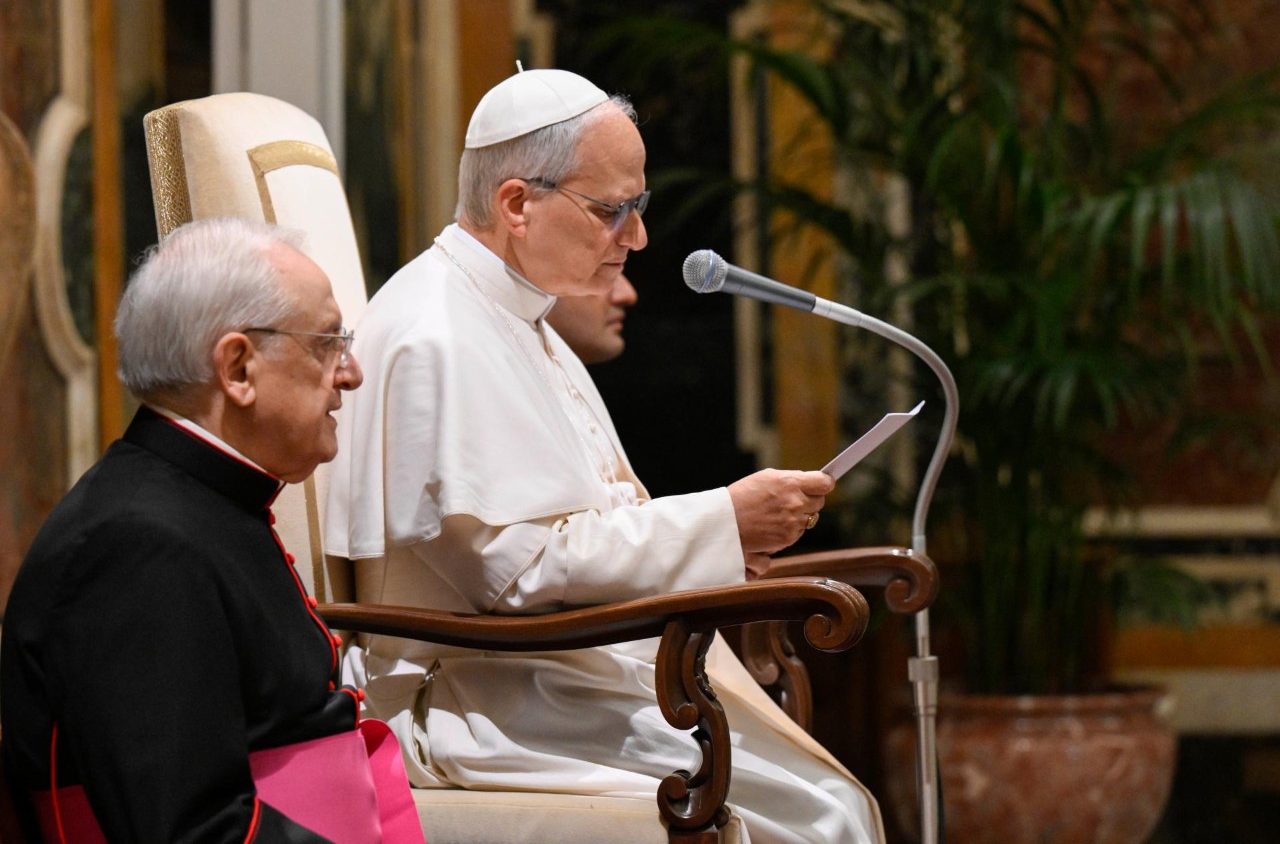🇮🇹 Versione italiana
Vatican City – This morning, in the Clementine Hall of the Apostolic Palace, His Holiness Pope Leo XIV received in audience the members of the Centesimus Annus – Pro Pontifice Foundation, gathered for their General Assembly and International Conference. The Pope delivered a rich and carefully articulated address to those present, greeting them warmly with a cheerful: “Good morning everyone! Buongiorno!” – a phrase that instantly set a tone of cordiality and welcome.
This year’s conference theme – “Overcoming polarisations and rebuilding global governance: the ethical foundations” – provided the Pope with the opportunity for a profound reflection on the current mission of the Church’s Social Doctrine. In a time marked by conflicts, inequalities, forced migrations, environmental crises and new technologies often beyond human control, Pope Leo XIV emphasised the importance of discernment and dialogue as essential tools to confront global challenges with a spirit rooted in the Gospel and ethical responsibility.
With words both realistic and hopeful, Pope Leo reminded those present that even in the darkest moments of history, “the Risen One goes before us,” renewing the call to build bridges, to choose encounter over confrontation, and to educate one another in the ways of peace. He evoked the teaching of Pope Leo XIII, who also lived in times of great transformation, and echoed a phrase used by Pope Francis, describing our era as a “polycrisis” – a set of interconnected crises that require a deep, shared, and wise reading of reality.
At the heart of the Pope’s address was a delicate yet central theme: the relationship between doctrine and dialogue. Pope Leo XIV sought to make it clear that the Church’s Social Doctrine is not a rigid collection of pre-packaged answers, nor does it claim to hold all the truth. Rather, it is a common journey towards truth, a form of knowledge born of reflection, experience, and listening. “Indoctrination is immoral,” the Pope warned, “because it denies critical judgement and prevents the conscience from opening to change.” True doctrine, by contrast, serves as a guide for approaching people and problems with respect, intelligence, and prudence.
In this light, the Holy Father urged the Foundation not to confine itself to transmitting abstract concepts, but to become a living workshop of listening and participation, especially by involving those who live in social and existential peripheries. “The poor are not merely recipients of Social Doctrine,” he stated, “but protagonists, interpreters, concrete witnesses.” It is from their perspective that the Church is called to reinterpret the signs of the times, in order to respond to the deepest questions of the new generations, who – as he noted – are increasingly seeking justice, spirituality, and authentic relationships.
The Pope concluded his address with an impassioned appeal to continue the work of communal discernment, engaging the whole People of God, with creativity and fidelity to the Gospel. He then thanked the members of the Foundation for their commitment and prayers, imparting his blessing upon them, their families, and their work.

Centesimus Annus – Pro Pontifice Foundation
The Foundation was established in 1993 at the behest of Saint John Paul II, in the wake of his Encyclical Centesimus Annus, published in 1991 on the hundredth anniversary of the historic Rerum Novarum by Leo XIII, whose legacy the current Pontiff has consciously chosen to embrace. Like the encyclical that inspired it, the Foundation was born to reaffirm the central role of the human person in the economic and social spheres, with the goal of promoting and disseminating the Church’s Social Doctrine among entrepreneurs, economists, professionals, and all people of goodwill.
From its inception, the initiative has been led by a group of lay Catholics active in the financial and business world, eager to translate the Gospel into concrete and responsible decisions. This is not merely a matter of theoretical reflection: the Foundation also supports the activities of the Holy See, contributing generously to the many charitable and pastoral initiatives promoted by the Church across the globe. Over the years, the Foundation has experienced significant growth, gradually expanding to embrace an international dimension. While initially composed solely of Italian members, since 2004 the Board has welcomed individuals from other countries, thereby strengthening its global profile. Today, the Foundation is based in the Apostolic Palace and operates under the supervision of the President of the APSA (Administration of the Patrimony of the Apostolic See), currently H.E. Monsignor Giordano Piccinotti.
With a growing network of members and supporters, the Foundation continues to provide opportunities for formation, study, and dialogue on major themes such as economy, justice, and peace, always attentive to the Church’s teaching.
Today’s audience with the Pope thus represents not only a moment of confirmation and encouragement, but also a renewed impetus to press on with conviction in the journey undertaken: to proclaim the Gospel of justice and fraternity, even within the most complex contexts of the contemporary world.
d.S.V.
Silere non possum